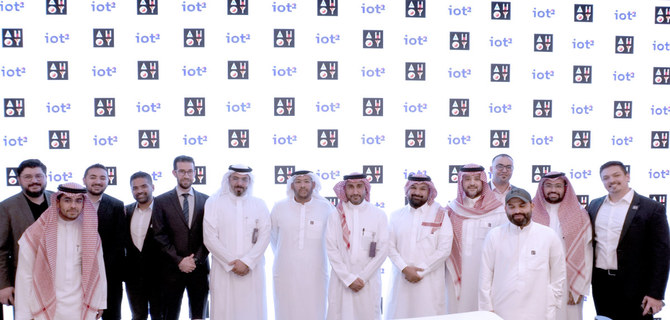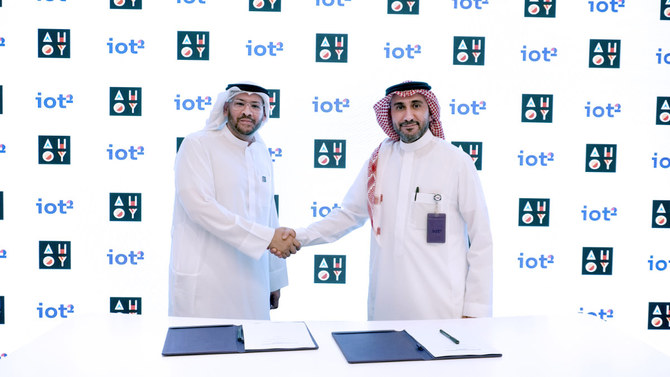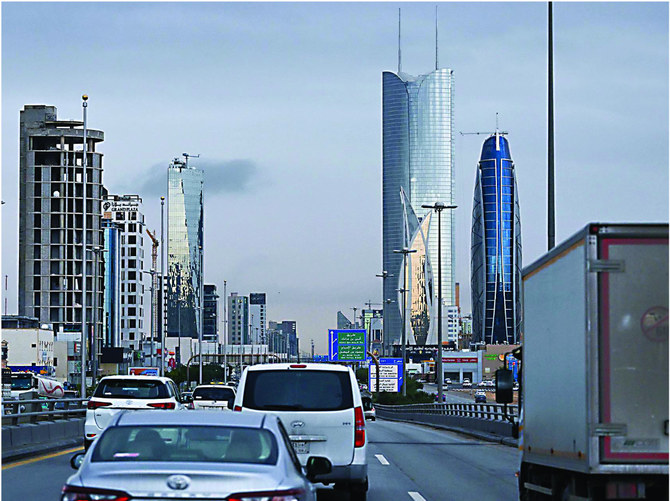CAIRO: Saudi Arabia’s mobility sector is set to benefit from the collaboration of the Public Investment Fund-backed iot squared and UAE-based AHOY Technology as the former will obtain software licensing and resale rights of IT products offered by the latter.
The partnership aims to launch AHOY’s comprehensive suite of products and services including technology infrastructure, software development kits, and programming interfaces in the Kingdom. The Saudi firm, iot squared, is a joint venture between the PIF and etc Group.
In an interview with Arab News, AHOY CEO Jamil Shinawi expressed optimism over the prospects of his firm’s partnership with iot squared.
“Internet of Things is the eyes, ears, and senses of our technology, iot squared comes not only with a great purpose but also with an amazing world-class team that is more than capable of creating wonders,” he added
Shinawi said his company is well-equipped to tackle challenging projects and contribute to the success of the Kingdom’s Vision 2030 plans.
AHOY is a unique deep-tech company that provides developers with the tools needed to build efficient, lean, and automated movement operations solutions through data, insights, and intelligence.
Shinawi said the Kingdom is undergoing “an amazing” transformation and evolving at the socioeconomic, industrial, and technological levels.
“We, at AHOY, consider ourselves a catalyst for such a change,” as the company is involved with several projects, some of which are backed by the PIF, in different sectors such as aviation and mobility.
The IT firm has also established a regional commercial office in Riyadh.
IT products
Among the company’s licensed products, COMET stands out as a software-as-a-service platform designed to optimize and seamlessly integrate logistical platforms, ensuring end-to-end efficiency. FLY+ provides a platform-as-a-service solution for a smarter travel experience, offering remote check-in, door-to-door services, and efficient handling of left-behind luggage.
Additionally, AHOY’s Movement Studio technology infrastructure facilitates the development of tailor-made software tools, enabling the affordable and rapid creation of futuristic solutions, systems, and applications. These solutions accurately orchestrate movement and routing, catering to the needs of enterprises and complex commercial-grade applications.
Opportunities
Shinawi acknowledges that the Kingdom’s heavy investment in technology and innovation presents immense opportunities for the company. AHOY aims to attract 100 new enterprise clients from Saudi Arabia in the coming years.
Having exceeded over $16 million in revenues since its inception, the company reached the threshold of profitability last year.
“We have raised close to SR60 million ($16 million) from 2018 to date, this has been used to build our technology, develop and conduct limited operation of use-cases to demonstrate scalability,” he said.
Shinawi told Arab News that in the first five months of 2023, his IT firm had surpassed last year’s revenue.
AHOY raised approximately SR1 million from an angel round in 2019, SR12 million in 2020, and SR45 million in 2022.
Shinawi also revealed plans to secure additional funding through a Series D round in 2023. The company aspires to become the region’s first decacorn, reaching a valuation of $10 billion, he added.
Expanding on its global presence, AHOY already operates in 60 markets and aims to establish a global user base within 18 months. By the end of the year, AHOY aims to operate in 120 geographies.
“We are close to 100 people globally and we do not want to exceed 120 people even in the future, any requirement in growth in our structure happens in spin-off companies that are subsidiaries,” Shinawi explained.
Future strategy
Shinawi also disclosed the launch of autonomous command and control and planning artificial intelligence orchestrators in 2023. The new products, he said, will make operations management efficient manifold.
Moreover, AHOY is actively developing a neural network-based solution targeting traffic, water, and data management.
It is committed to bridging the technology gap by providing a framework that streamlines dynamic movement and equips developers, implementation partners, and systems.
Shinawi believes in supporting the growth of small and medium enterprises which he considers the driving force of any economy.
“SMEs are our passion,” he said. “Such a transformative vision like Saudi Vision 2030 necessitates sustainable development through technology, and AHOY is committed to supporting every hand that contributes to this noble cause and the evolution of humanity and life.”
He added that AHOY is perfectly suited to support the developments of Vision 2030, whether in smart cities, people and goods flow, or AI and machine learning.


















